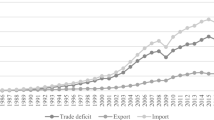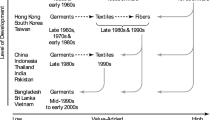Abstract
There has been tremendous growth in the sales of certified fair trade products since the introduction of the first of these goods in the Netherlands in 1988. Many would argue that this rapid growth has been due in large part to the increasing involvement of corporations. Still, participation by corporations in fair trade has not been welcomed by all. The basic point of contention is that, while corporate participation has the potential to rapidly extend the market for fair trade goods, it threatens key aspects of what many see as the original vision of fair trade – most notably a primary concern for the plight of small producers and the goal of developing an alternative approach to trade and development – and may even be undermining its long-term survival. The primary purpose of this article is to explore the normative issues involved in corporate participation in fair trade. In order to do that, however, it first provides a positive analysis of how corporations are actually involved in fair trade. In order to achieve both of these ends, the article draws upon global value chain analysis.
Similar content being viewed by others
Abbreviations
- ATO:
-
alternative trade organization
- EFTA:
-
European Fair Trade Association
- FINE:
-
FLO-I + IFAT + NEWS + EFTA
- FLO:
-
Fair Labelling Organization
- FLO-I:
-
Fair Labelling Organizations International
- FTF:
-
Fair Trade Federation
- GVC:
-
global value chain
- IFAT:
-
International Federation of Alternative Trade
- NAATO:
-
North American Alternative Trade Organization
- NEWS:
-
Network of European Worldshops
- NGO:
-
Non-governmental organization
- TNC:
-
transnational corporation
- UCIRI:
-
Unión de Comunidades indígenas de la Regiódel Istmo (Union of Indigenous Communities of the Region of the Isthmus)
- UFCO:
-
United Fruit Company
References
Barrientos S., M. E. Conroy, E. Jones: 2007, Northern Social Movements and Fair Trade, In L. T. Raynolds, D. Murray, J. Wilkinson (eds.), Fair Trade: The Challenges of Transforming Globalization. (Routledge, London and New York), pp. 51–62
Bezençon V.: 2007, ‹Penetration of Fair Trade in Mainstream Distribution: Key Management Factors and Impact’, in Cahier de Research en Marketing and Management (Universite de Neuchâtel, Neuchâtel, Switzerland)
Bouchard, M. J, C. Ferraton and V. Michaud: 2006, ‹Database on Social Economy Organizations: The Qualification Criteria’, Working Papers of the Canada Research Chair on the Social Economy, Research Series no. 2006–03
Byrne, S.: 2006, ‹Benefits, Challenges and Limitations of Fair Trade as a Social Justice Movement’. M.A. Thesis (Social Justice Studies), Brock University, Canada
Cunningham F.: 2002, Theories of Democracy: A Critical Introduction (Routledge, London)
Davies I., A. Crane: 2003, Ethical Decision Making in Fair Trade Companies, Journal of Business Ethics, 45, 79–92
Develtere, P. and I. Pollet: 2005, ‘Co-Operatives and Fair’Trade’. Background Paper Commissioned by the’Committee for the Promotion and Advancement’of Co-Operatives (COPAC) for the COPAC Forum on Fair Trade and Co-operatives, February, Berlin
Doherty B., S. Tranchall: 2005, New Thinking in International Trade? A Case of the Day Chocolate Company, Sustainable Development 13, 166–176
Dolan C., J. Humphrey: 2004, Changing Governance Patterns in the Trade in Fresh Vegetables Between Africa and the United Kingdom, Environment and Planning 36(3), 491–509
Edwards M.: 1999, International Development NGOs: Agents of Foreign Aid or Vehicles for International Cooperation?, Non-Profit and Voluntary Sector Quarterly 28, 25–37
Eshuis, F. and J. Harmsen: 2003, ‘Making Trade Work for the Producers: 15 Years of Fairtrade Labelled Coffee in the Netherlands’, Max Havelaar Foundation, Netherlands. Available online at: http://www.fairtrade.org.uk/downloads/pdf/making_trade_work.pdf (accessed on 18 November 2007)
FLO-Cert: 2007, Homepage, available online at: www.flo-cert.net (accessed on 18 November 2007)
Fridell G.: 2007, Fair Trade: The Prospects and Pitfalls of Market-Driven Social Justice (University of Toronto Press, Toronto)
Frundt H.: 2005, Towards a Hegemonic Resolution in the Banana Trade, International Political Science Review 26(2), 215–237
Gendron, C., V. Bisaillon and A. I. Otero Rance: 2008, `The Institutionalization of Fair Trade: More than Just a Degraded Form of Social Action', Journal of Business Ethics, doi 10.1007/s10551-008-9758-4
Gereffi G.: 1994, The Organization of Buyer-Driven Global Commodity Chains: How US Retailers Shape Overseas Production Networks, in G. Gereffi, M. Korzeniewicz, (eds), Commodity Chains and Global Capitalism (Praeger, Westport, Conn.), pp. 95–122
Gereffi G.: 1995, Global Production Systems and Third World Development, in B. Stallings (ed.), Global Change, Regional Response: The New International Context of Development (Cambridge University Press, Cambridge, Mass.), pp. 100–142
Gereffi G., J. Humphrey, T. Sturgeon: 2005, The Governance of Global Value Chains, Review of International Political Economy 12(1), 78–104
Golding K., K. Peattie: 2005, In Search of a Golden Blend: Perspectives on the Marketing Fair Trade Coffee, Sustainable Development 13, 154–65
Grodnik A., M. E. Conroy: 2007, Fair Trade Coffee in the US, in L. T. Raynolds, D. Murray, J. Wilkinson (eds.), Fair Trade: The Challenges of Transforming Globalization (Routledge, London and New York), pp. 81–102
Hockerts, K.: 2005, ‘The Fair Trade Story’, OIKOS Sustainability Case Collection, OIKOS Foundation for Economy and Ecology. Available online at: www.oikos-foundation.unisg.ch/homepage/case.htm (accessed on 18 November 2007)
Hudson A.: 2001, NGOs’ Transnational Advocacy Networks: From “Legitimacy” to “Political Responsibility?”, Global Networks 1(4), 331–352
Hudson M., I. Hudson: 2004, Justice, Sustainability, and the Fair Trade Movement: A Case Study of Coffee Production in Chiapas, Social Justice 31(3), 130–146
International Institute for Environment and Development (IIED): 2000, Fair Trade: Overview, Impact, Challenges. Study to Inform DFID’s Support to Fair Trade (IIED, London)
International Fair Trade Association (IFAT): 2006, ‘Standards for Fair Trade Support Organisations and Fair Trade Networks’, available online at: http://www.ifat.org/index.php?option=com_content&task=view&id=2&Itemid=14 (accessed on 18 November 2007)
Kocken, M.: 2003, ‘Fifty Years of Fair Trade: A Brief History of the Fair Trade Movement’, available online␣at: www.gepa3.de/download/gepa_Fair_Trade_history_en.pdf (accessed on 3 July 2007)
La Cruz, G.: 2005, ‘The Contribution of Fair Trade Towards Market Access by Smallholder Banana Producers’, in R. Reuben et al. (eds.), Agro-Food Chains and Networks for Development (Springer, Dordrecht), pp. 69–78
LeClair M. S.: 2002, Fighting the Tide: Alternative Trade Organizations in the Era of Global Free Trade, World Development 30(6), 949–958
Littrell M. A., M. A. Dickson: 1997, Alternative Trading Organizations: Shifting Paradigm in a Culture of Social Responsibility, Human Organization 56(3), 344–352
Low W., E. Davenport: 2005, Postcards from the Edge: Maintaining the “Alternative” Character of Fair Trade, Sustainable Development 13(3), 143–153
Low, W. and E. Davenport: 2008, `Organizational Leadership, Ethics and the Challenges of Marketing Fair and Ethical Trade', Journal of Business Ethics, doi 10.1007/s10551-008-9763-7
McGrew, T.: 2004, ‘Transnational Democracy: Theories and Prospects’, Discussion Paper Series, No. 1, Centre for Globalisation, Europeanisation and Democracy, Aalborg University, Denmark
Moore G.: 2004, The Fair Trade Movement: Parameters, Issues and Future Research, Journal of Business Ethics 53, 73–86
Mutersbaugh T.: 2005, Just-In-Space: Certified Rural Products, Labour of Quality and Regulated Spaces, Journal of Rural Studies 21, 389–402
Murray D. L., L. Raynolds: 2000, Alternative Trade in Bananas: Obstacles and Opportunities for Progressive Social Change in the Global Economy, Agricultural and Human Values 17, 65–74
Murray D. L., L.T. Raynolds, P. L. Taylor: 2006, The Future of Fair Trade Coffee: Dilemmas Facing Latin America’s Small Scale Producers, Development in Practice 16(2), 179–192
Ponte, S.: 2004, ‘Standards and Sustainability in the Coffee Sector: A Global Value Chain Approach’, International Institute for Sustainable Development Working Paper (IISD, Winnipeg)
Quarter, J., L. Mook and B. J. Richmond: 2003, ‘What is the Social Economy?’, Centre for Urban and Community Studies, Research Bulletin No. 13, available online at: http://www.urbancentre.utoronto.ca/pdfs/researchbulletins/13.pdf (accessed on 18 November 2007)
Randall D. C.: 2005, An Exploration of Opportunities for the Growth of the Fair Trade Market: Three Cases of Craft Organizations, Journal of Business Ethics 56, 55–67
Raynolds L. T.: 2000, Re-Embedding Global Agriculture: The International Organic and Fair Trade Movements, Agriculture and Human Values 17, 297–309
Raynolds L. T.: 2007, Fair Trade Bananas: Broadening the Movement and Market in the United States, in L. T. Raynolds, D. Murray, J. Wilkinson (eds.), Fair Trade: The Challenges of Transforming Globalization (Routledge, London and New York), pp. 15–32
Raynolds L. T., M. A. Long: 2007, Fair/Alternative Trade: Historical and Empirical Dimensions, in L. T. Raynolds, D. Murray, J. Wilkinson (eds.), Fair Trade: The Challenges of Transforming Globalization (Routledge, London and New York), pp. 15–32
Raynolds L. T., D. L. Murray: 2007, Fair Trade: Contemporary Challenges and Future Prospect, in L. T. Raynolds, D. Murray, J. Wilkinson (eds.), Fair Trade: The Challenges of Transforming Globalization (Routledge, London and New York), pp. 223–234
Reed D.: 1999, Three Realms of Corporate Responsibility: Distinguishing Legitimacy, Morality and Ethics, Journal of Business Ethics 21(3), 23–35
Redfern, A. and P. Snedker: 2002, ‘Creating Market Opportunities for Small Enterprises: Experiences of the Fair Trade Movement’, SEED Working Paper No. 30 (International Labour Office, Geneva)
Renard M.-C.: 2003, Fair Trade: Quality, Markets and Conventions, Journal of Rural Studies 19, 87–96
Renard M.-C.: 2005, Quality Certification, Regulation and Power in Fair Trade, Journal of Rural Studies 21, 419–431
Renard M.-C., V. Pérez-Grovas: 2007, Fair Trade Coffee in Mexico: At the Center of the Debates, In L. T. Raynolds, D. Murray, J. Wilkinson (eds.), Fair Trade: The Challenges of Transforming Globalization (Routledge, London and New York), pp. 138–156
Roozen N., F. VanderHoff Boersma: 2001, L’aventure du Commerce Équitable: Une Alternative à la Mondialization par les Fondateurs de Max Havelaar (Jean-claude LattÉs, Paris)
Shreck A.: 2005, Resistance, Redistribution and Power in the Fair Trade Banana Initiative, Agriculture and Human Values 22, 17–29
Simpson C., A. Rapone: 2000, Community Development from the Ground Up: Social Justice Coffee, Human Ecology Review 7(1), 46–57
Smith S., S. Barrientos: 2005, Fair Trade and Ethical Trade: Are There Moves Towards Convergence?, Sustainable Development 13, 190–198
Tallontire A.: 2000, Partnerships in Fair Trade: Reflections from a Case Study of Cafédirect, Development in Practice 10(2), 166–177
Taylor P. L.: 2005, In the Market but Not of It: Fair Trade Coffee and Forest Stewardship Council Certification as Market-Based Social Change, World Development, 33(1), 129–147
Taylor P. L., D. L. Murray, L. T. Raynolds: 2005, Keeping Trade Fair: Governance Challenges in the Fair Trade Coffee Initiative, Sustainable Development 12, 199–208
Utting, P.: 2005, ‘Rethinking Business Regulation: From Self-Regulation to Social Control’, Programme Paper on Technology, Business and Society, Paper No. 15 (UNRISD, Geneva)
Van den Berghe, F.: 2006, ‘Good Coffee, Bad Governance? The Legitimacy of FLO’, Center for Human Rights and Global Justice Working Paper Series, No. 12 (NYU School of Law, New York)
VanderHoff Boersma, F.: 2008, `The Urgency and Necessity of a Different Type of Market: The Perspective of Producers Organized Within the Fair Trade Market', Journal of Business Ethics, doi 10.1007/s10551-008-9766-4
Waridel L.: 2002, Coffee with Pleasure: Just Java and World Trade (Black Rose, Montréal)
Wilkinson, J.: 2006, ‘Fair Trade Moves Centre Stage’, Edelstein Centre for Social Research Working Paper Series, No. 3 (Edelstein Centre for Social Research, Rio de Janeiro)
Wilkinson J., G. Mascarenhas: 2007, Southern Social Movements and Fair Trade, in L. T. Raynolds, D. Murray, J. Wilkinson (eds.), Fair Trade: The Challenges of Transforming Globalization (Routledge, London and New York), pp. 125–137
Acknowledgement
The author would like to acknowledge support from the Social Science and Humanities Research Council of Canada (Social Economy Suite competition) which made the writing of this article possible.
Author information
Authors and Affiliations
Corresponding author
Rights and permissions
About this article
Cite this article
Reed, D. What do Corporations have to do with Fair Trade? Positive and Normative Analysis from a Value Chain Perspective. J Bus Ethics 86 (Suppl 1), 3–26 (2009). https://doi.org/10.1007/s10551-008-9757-5
Published:
Issue Date:
DOI: https://doi.org/10.1007/s10551-008-9757-5




